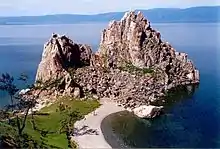Baikal
English
Etymology
From Russian Байка́л (Bajkál, “Baikal”), from Buryat Байгал нуур (Bajgal nuur, “Lake Baikal”), perhaps ultimately from the Turkic *bāj (“rich”), and *köl, *(k)ȫl (“lake”),[1][2] with reference to the abundance of high-quality salmon in the lake. The Turkic origin is rejected by Vasmer.[3] Native Mongolic origins have also been proposed.
Proper noun
Baikal

Lake Baikal
- A large freshwater lake in southern Siberia, Russia; the deepest lake in the world.
Derived terms
- Baikal Mountains
- Baikal seal
Translations
a large lake in Russia
|
|
See also
- Khövsgöl Nuur ("younger sister" of Baikal)
References
- Krech, Shepard (2003) Encyclopedia of World Environmental History: F-N, Routledge, page 745
- Janhunen (1996, 139-41), in: Maria Magdolna Tatár, Köl "lake, flood, source, moor" in Northem Mongolian Hydronyms. Turcological Letters to Bernt Brendemoen, The Institute for Comparative Researchin Human Culture, Oslo 2009. p.329.
- Vasmer, Max (1964), “Байкал”, in Etimologičeskij slovarʹ russkovo jazyka [Etymological Dictionary of the Russian Language] (in Russian), volume I, translated from German and supplemented by Trubačóv O. N., Moscow: Progress, page 107f
Finnish
Declension
| Inflection of Baikal (Kotus type 6/paperi, no gradation) | |||
|---|---|---|---|
| nominative | Baikal | — | |
| genitive | Baikalin | — | |
| partitive | Baikalia | — | |
| illative | Baikaliin | — | |
| singular | plural | ||
| nominative | Baikal | — | |
| accusative | nom. | Baikal | — |
| gen. | Baikalin | ||
| genitive | Baikalin | — | |
| partitive | Baikalia | — | |
| inessive | Baikalissa | — | |
| elative | Baikalista | — | |
| illative | Baikaliin | — | |
| adessive | Baikalilla | — | |
| ablative | Baikalilta | — | |
| allative | Baikalille | — | |
| essive | Baikalina | — | |
| translative | Baikaliksi | — | |
| instructive | — | — | |
| abessive | Baikalitta | — | |
| comitative | — | — | |
Portuguese
This article is issued from Wiktionary. The text is licensed under Creative Commons - Attribution - Sharealike. Additional terms may apply for the media files.